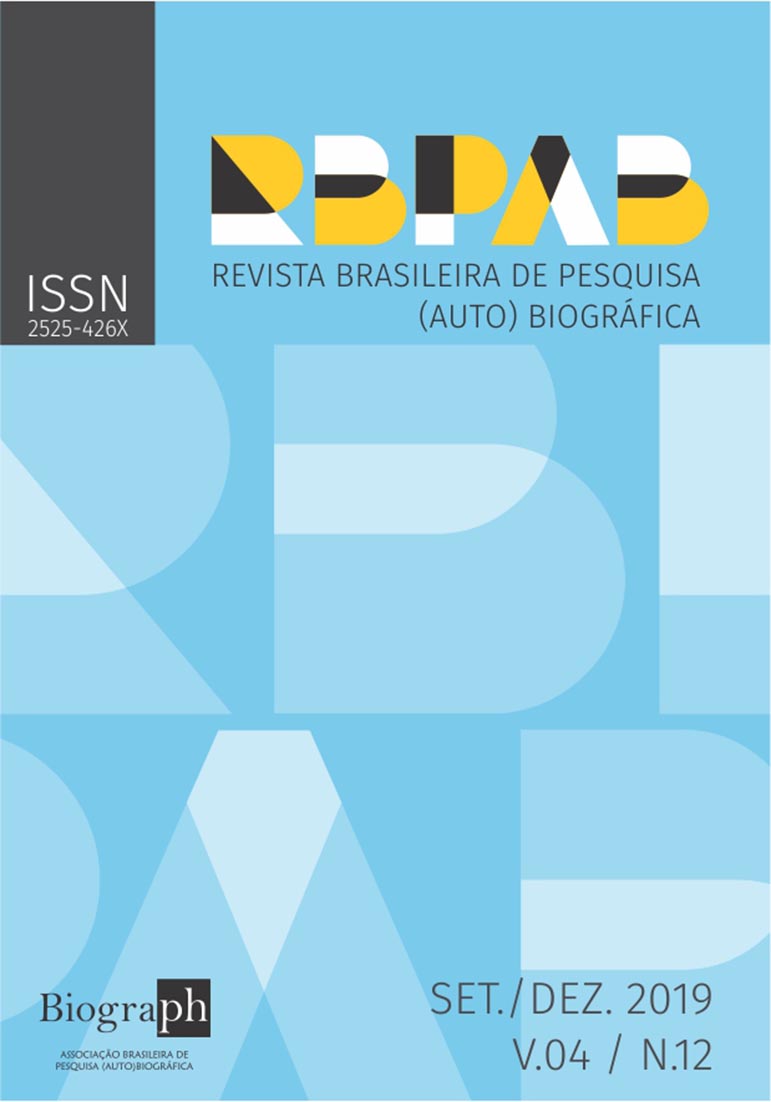Environmental education research and significance of experience: the depth of life history brought about by mutual relationships
DOI:
https://doi.org/10.31892/rbpab2525-426X.2019.v4.n12.p903-917Palavras-chave:
Biography, Environmental education, Life story, Sustainable developmentResumo
This paper describes the correlation between research and researcher and his/her own life story. How is the researcher’s own experience understood, meaningful, and rebuilt? This paper shows that studying the subject using the life story approach itself makes the biography of the researcher vivid. It points out that the interaction between researchers and subjects is dynamic and suggests that the life story approach may enrich the stage of research in the environmental education area.
Downloads
Referências
ANDO, Toshihiko. Modernity of Pollution Education: Facing the Suffering. In: Study on Children's Education after March 11: From Science Education, Pollution Education, Environmental Education, ESD. Japan: Soufusha, 2013. p. 91-110.
ANDO, Toshihiko. The Meaning of Inquiring about Kogai Kyoiku. Environmental Education, v. 25, n. 1, p. 4-13, Jul. 2015. Available at https://doi.org/10.5647/jsoee.25.1_4 Accessed on:13/09/2019.
FURIHATA, Shinishi. Current Status and Perspective of Environmental Education Research in Japan. Environmental Education, v. 19, n. 3, p. 76-87, Mar.2010. Available at: https://doi.org/10.5647/jsoee.19.3_76 Accessed on: 13/09/2019.
HARAKO, Eiichiro. Developing an Academic Field Based on the Idea of Environmental. Education, Environmental Education, v. 19, n. 3, p. 81-101, Mar. 2010. Available at: https://doi.org/10.5647/jsoee.19.3_88 Accessed on: 13/09/2019.
HARADA, Tai. “The possibility of Theoretical Research on ESD in Japan”. Environmental Education, v. 19, n. 2, p.3-13, Dec. 2009. Available at: https://doi.org/10.5647/jsoee.19.2_31 Accessed on: 13/09/2019.
Environmental Education. Japan Society for Environmental Education, Japan: 2012.
KITOH, Shuichi. Environmental Ethics as the Principle of Minamata and Resistance. In:SAISHU. Fifty Years of Minamata: Spreading Thoughts of Minamata. Japan: Sakuhinsha, 2007. p. 131-145,
KITOH, Shuichi et. alli. Iwanami Lecture Philosophy ⑻ Life / Environment Philosophy. Japan: Sakuhinsha, 2009. p. 151-170.
KITOH, Shuichi et. alli. Environmental Conference Spring Issue. Japan: Sakuhinsha, 2017. p. 40-45,
MARUYAMA, Yashusi. Reconsideration of Natural Preservation. Environmental Sociology, v. 3, p. 149-164. Sep. 1997. Available at: https://doi.org/10.24779/jpkankyo.3.0_149 Accessed on: 13/08/2019.
MIKI, Yuko. Rebuilding of Idealistic Framework of Environmental Education. Journal of Environmental Thoughts and Education, Japan, The Society for the Study of Environmental Thoughts and Education, v. 11 p. 101-110, Sep. 2018.
NOMURA, Kou. The Characteristics and Challenges of Environmental Education (EE) Research in Japan: A Review of the Japanese Journal of EE with Reference to Kogai Education Research. Environmental Education, v. 25, n. 1, p. 82-95, Jul. 2015. Available at: https://doi.org/10.5647/jsoee.25.1_82 Accessed on: 13/08/2019.
NAGATA. Yoshiyuki. Has the "Decade of ESD" Changed?: Five Myths of Japanese ESD. Reports for the ESD Global Action Program (GAP) Japan Environmental Education, p.11-18, 2015.
NINOMIYA-Lim Sachi and ABE, Osamu. Impacts of Education for Sustainable Development (ESD) on Environmental Education Research and Practice in Japan under the Decade of ESD (DESD) and Further Challenges. Environmental Education, v. 24, n. 3, p. 18-31, Mar. 2015. Available at: https://doi.org/10.5647/jsoee.24.3_18 Accessed on: 13/08/2019.
SASAGAWA, Kouichi and MAKINO, Atsushi. Reconsidering Education for Sustainable Development from the Viewpoint of the Study of Adult and Community Education: The Main Findings of Project Study of "Education for Sustainable Development as Adult and Community Education. Environmental education, v. 24, n. 3, p. 4-17. Mar. 2015. Available at: https://doi.org/10.5647/jsoee.24.3_4 Accessed on: 13/08/2019.
SHIBAKAWA, Hiroko. Critical Analysis of the Concept of Education in ESD. Bulletin of the Graduate School of Human Development and Environment, Kobe University, v. 10 n. 2, p. 73-90. Mar. 2017. Available at: http://www.h.kobe-u.ac.jp/ja/node/18 Accessed on: 13/08/2019.













































